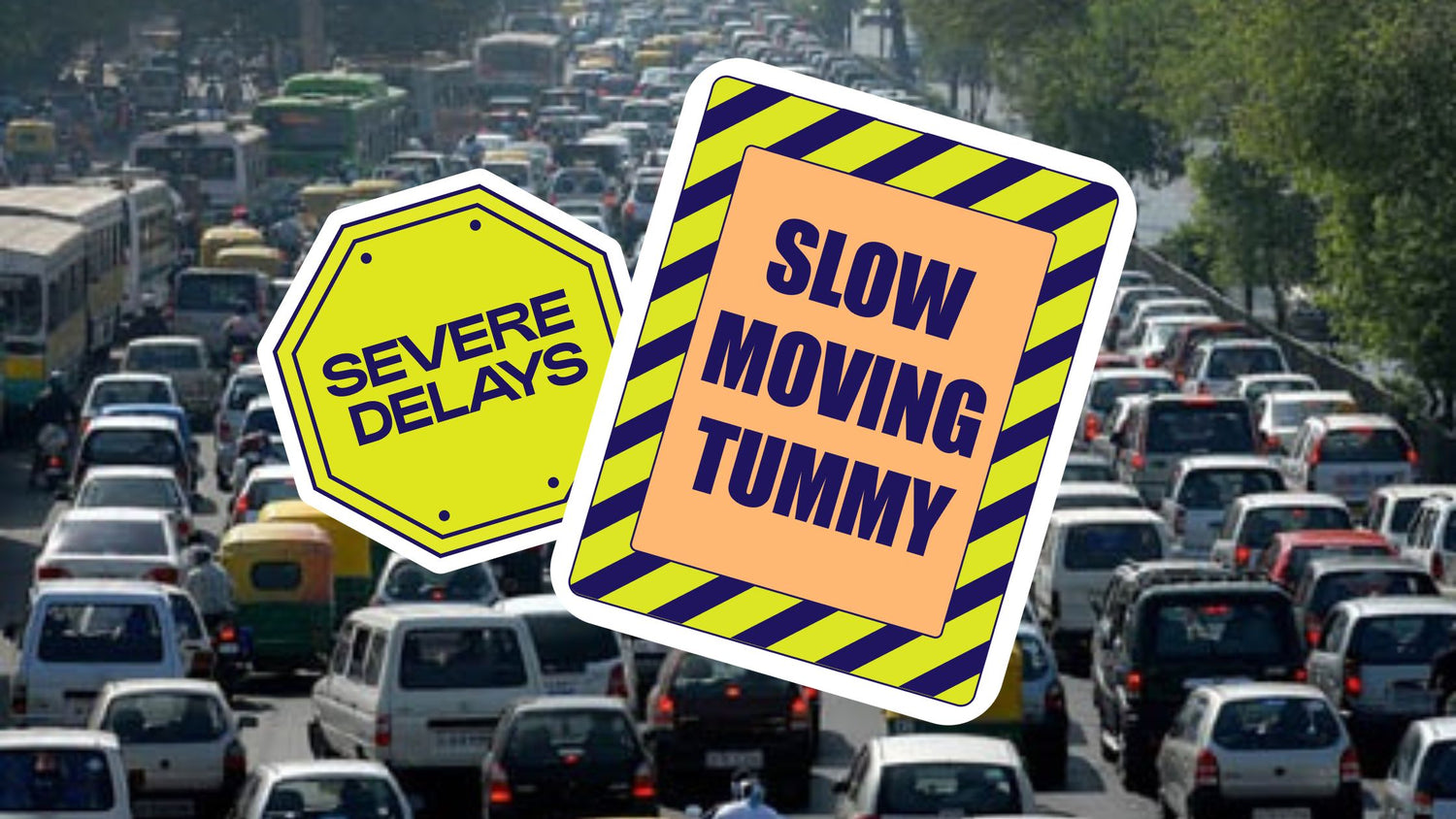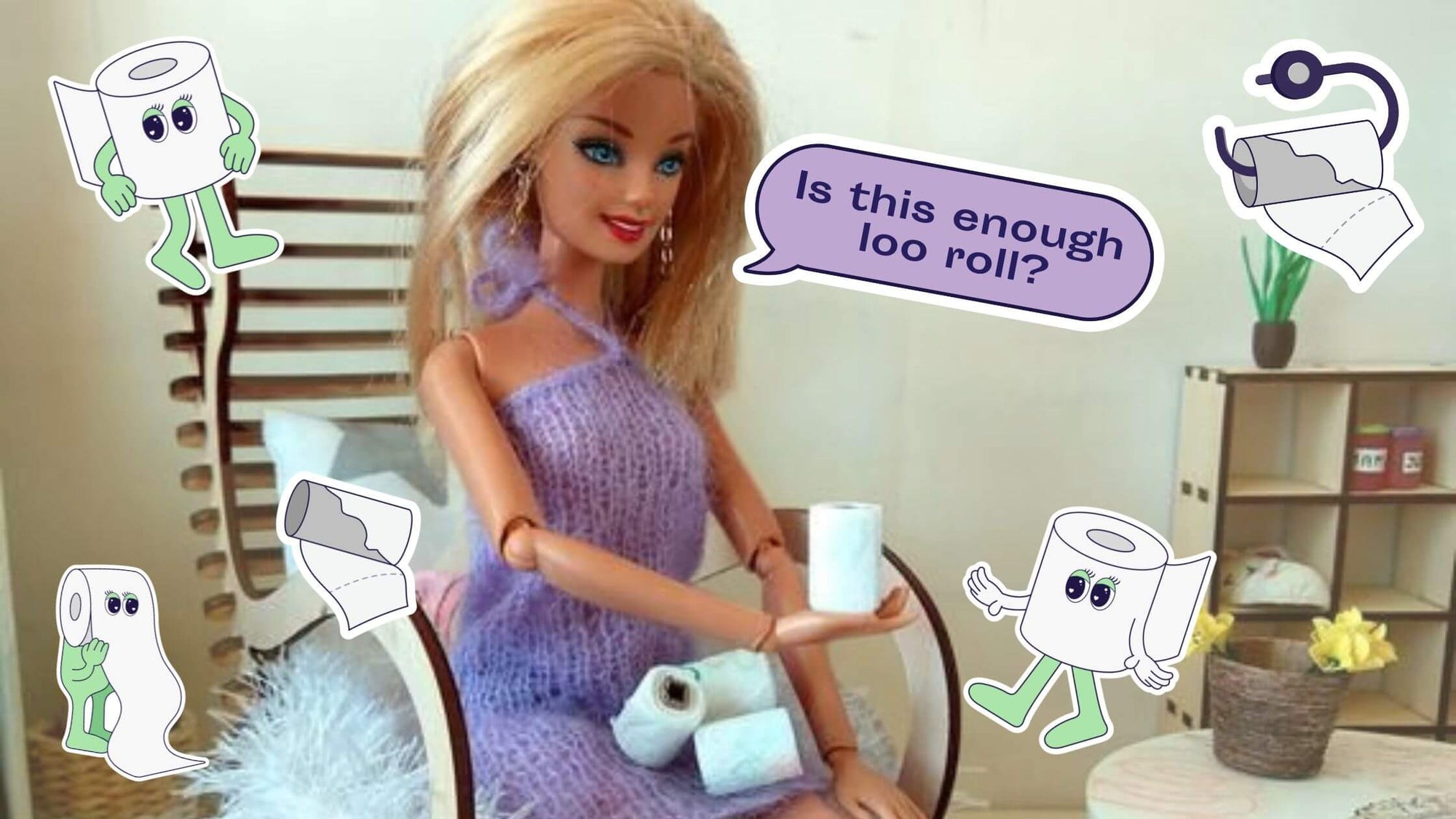Even if it’s something you don’t necessarily experience much yourself, I’m sure you’re familiar with constipation. This common digestive symptom affects one in every seven adults and one in every three children in the United Kingdom at any one time.
Learning the main symptoms of constipation and the main things that cause it is important for recognising it in yourself and managing it effectively. In many cases, knowing why constipation occurs can help you prevent this digestive issue from developing in the first place.
In this article, I’m going to cover everything you need to know about constipation, including what it is, what the main symptoms of constipation are, what its most common triggers are, and how you can relieve constipation naturally.
What Is Constipation?
Constipation is a common symptom of digestive disorders like irritable bowel syndrome (IBS) and inflammatory bowel disease (IBD), although there are many other things that can cause it to occur. It’s something that anybody can experience at any time in their lives. For some it’s a temporary symptom that comes and goes. For others, it’s an ongoing issue that leads to additional symptoms like bloating.
Constipation can be medically defined as fewer than three bowel movements in a single week and is often accompanied by additional digestive symptoms like bloating, gas, and abdominal distension. However, if your usual bowel pattern is to go to the toilet three times a week for you, constipation could be defined as any less than this frequency.
You’re not necessarily constipated if you miss just one bowel movement, but missing several is definitely an indicator that something isn’t quite right. It’s more of a trend over time, and many doctors will wait a month or two to notice a person’s general bowel habits when diagnosing constipation or an underlying digestive health condition.
What Are the Symptoms of Constipation?
Constipation is a symptom of many digestive disorders, but it also has its own set of symptoms. The main symptoms associated with constipation include bloating, gas (increased burping and flatulence), abdominal discomfort or cramping, and a feeling that you’re bunged up.
Let’s go into each of these symptoms in more detail so you know exactly how to spot them.
Bloating
Bloating is one of the most common symptoms of constipation. When the stool stays in the colon for longer than it normally would, it causes a buildup of gas, causing bloating. The stool itself can also contribute to abdominal distention and bloating. These symptoms are often accompanied by a feeling of fullness, tightness, and pressure in the abdomen.
Gas
The probiotic bacteria in the colon ferment insoluble fibre from the foods you’ve ingested to produce short-chain fatty acids. The longer the stool remains in the large intestines, the more it can be fermented by the gut bacteria. Fermentation causes gas production (more specifically, hydrogen, carbon dioxide, and methanol), and this gas can build up in your large intestines and cause discomfort. This gas needs to be released somehow, so you might find that you’re burping and farting more than usual when you're constipated.
Abdominal discomfort or cramping
Most people who are constipated will experience some level of abdominal discomfort. Usually, this discomfort stems from the distention, bloating, and cramping that is caused by a buildup of gas and increased faecal mass (more stools) in the colon, and these symptoms should disappear when you manage to go to the toilet.
Feeling ‘bunged up’
Constipation often causes people to feel what they would colloquially describe as ‘being bunged up’. When the stools begin to buildup in the intestines and you’re unable to pass them, it causes a feeling of fullness in the abdomen and might feel like something blocked down there. If you manage to go to the toilet but don’t pass a full bowel movement, the feeling of being bunged up might remain until you’re able to fully empty your bowels.
A hard stool that is difficult to pass and straining with defection
Constipation leads to a hard stool that is difficult to pass because the body pulls water out of the stool if it’s been sitting in the colon for a long period of time. When the stool is hard and dry, it becomes very difficult to go to the toilet and could cause you to strain during bowel movements, which can be even more uncomfortable and unenjoyable.
What Can Trigger Constipation?
You can get constipated because of lots of different things. Below, I’ve broken down the most common causes of acute (short-term) and chronic (long-term) constipation.
Causes of acute constipation
Short-term constipation can result from:
Consuming too much sodium, saturated fat, or sugar
- Inadequate fibre intake
- Bring sedentary, such as if you’re travelling or you’re on holiday
- A change in your schedule (leading to changes in your food intake and potentially causing you to miss your usual toilet time)
- Not drinking enough water and becoming dehydrated
Causes of chronic constipation
Digestive disorders, including irritable bowel syndrome (IBS) and inflammatory bowel disease (IBD)
- Reproductive hormone imbalances due to excess stress, over-exercising, or an underlying reproductive health issue like hypothalamic amenorrhea (HA) and polycystic ovary syndrome (PCOS)
- Long-term use of certain medications and supplements, including antacids, antihypertensives, antiemetics, antidepressants, opioid painkillers, narcotics, and ferrous sulphate
What Are Some Daily Habits to Relieve Constipation?
Even if you suffer from constipation regularly, you’ll be glad to hear that there are lots of things you can do to relieve constipation naturally and return to your normal toilet regularity. Below, I’ve discussed some effective daily lifestyle habits you can incorporate into your routine for natural constipation relief.
Take a probiotic supplement
You might already eat probiotic-containing foods like yoghurt, kefir, and sauerkraut, but taking a probiotic supplement will boost your levels of beneficial bacteria significantly more than eating these foods. A probiotic supplement (ideally one that contains more than one billion probiotic bacteria) can support the beneficial bacteria in your gut microbiome and help maintain optimal digestive health.
Common probiotic bacterial species include Lactobacillus and Bifidobacterium. Alongside a few other species of bacteria, they perform a variety of functions inside the gut. They produce vitamins B12 and K, make short-chain fatty acids, and act in the immune system to prevent potentially harmful microorganisms from entering your bloodstream from your gut.
Taking a probiotic supplement can support your body’s natural gut bacteria and improve your metabolism, digestion, and immunity. A Dose For Bloating is an effective bloat-busting remedy that contains two billion probiotic bacteria, as well as seven different digestive enzymes and seven unique plant extracts. Our trusted supplement is a fan favourite, and right out of every ten people, they see the benefits of taking A Dose For Bloating within just a couple of weeks of daily use.
Add more fibre into your diet
Both soluble and insoluble fibre are beneficial for your digestion and can help to prevent constipation. Insoluble fibre is fermented by the gut bacteria in your colon and help to soften the stool, making it easier to pass and preventing you from getting constipated. It also slows down gastric emptying rate to promote satiety, keeping you fuller for longer.
Soluble fibre can prevent the absorption of dietary cholesterol to help maintain healthy blood cholesterol levels. It can also promote better digestive health and reduce the risk of digestive symptoms like constipation, gas, and bloating.
Aim for at least 3 grams of fibre in each meal at least or 6 grams if you’re aiming for a high-fibre meal. The recommendation is 30 grams of fibre a day for adults.
Fibre-rich foods include oats, whole wheat or bran cereals, wholemeal bread, broccoli, green beans, peas, potatoes, parsnips, apples, bananas, strawberries, almonds, peanuts, sesame seeds, and sunflower seeds. Incorporating more of these foods into your diet will promote better digestive health and keep constipation to a minimum.
Eat more potassium and less sodium
Potassium and sodium are two important electrolytes that regulate fluid balance within the body. Potassium aids peristalsis in the colon, helping to push food through the lower digestive tract and out of the body. Sodium, on the other hand, can increase the risk of constipation by pulling water out of the colon (and out of the stool), causing the stool to harden and become more difficult to pass.
For these reasons, consuming more potassium and less sodium is key for getting rid of constipation and maintaining great digestive health. Potassium-rich foods include sweet potatoes, avocados, bananas, oranges, raisins, dates, broccoli, spinach, and pumpkins. Alongside increasing your intake of these foods, decrease your intake of sodium-rich foods like takeaways, ready meals, and pre-packaged snacks like pretzels and crisps.
Drink more water
Staying hydrated is vital for preventing constipation. Drinking enough water throughout the day can help to keep your body well hydrated so it doesn’t need to pull fluid out of the stool to maintain fluid balance. When your stool has enough fluid, it will remain soft and easy to pass.
I recommend investing in a good-quality water bottle (ideally one made out of metal or glass, as plastic bottles can cause the water to taste a bit weird after a while). Keep this bottled fill with cold water and carry it around with your wherever you’re going during the day. This way, you can take regular sips throughout the morning and afternoon to prevent yourself from becoming dehydrated and constipated.
Drink a cup of coffee
Even though I always say in these articles that coffee can cause you to become dehydrated, so it’s best to avoid it if you’re constipated, there are some situations in which I would recommend you to drink some caffeinated coffee if you’re bunged up.
Caffeine isn’t just a diuretic that makes you wee more. It’s also a mild laxative. It stimulates the smooth muscle in the large intestines to cause peristalsis and push the stool out of the colon and rectum. So, drinking a caffeinated coffee could help to get things moving in your bowels and provide natural relief from constipation without you needing to take a synthetic laxative.
Drink a cup of herbal tea
In a similar way to caffeinated coffee, herbal teas can have mild laxative effects by increasing peristalsis in the large bowel. Herbal teas contain plant extracts that are natural alternatives to synthetic laxative medications and could be the answer to your constipation, whether it’s acute or chronic.
There are various types of herbal teas, all containing a variety of different plant extracts and flavours. Common and well-loved herbal teas include chamomile, ginger, lemon balm, peppermint, and rose.
Not every herbal tea will work for every person, and you’ll probably find that some are more suitable for you than others. I recommend trying a few different ones to see which you enjoy the taste of, and which are actually effective in helping you have a bowel movement.
I want to note here that, if you’re currently pregnant or breastfeeding, hold off on the herbal teas until you’ve consulted a specialist registered dietitian. Some herbal remedies are not recommended during pregnancy or breastfeeding, so it’s important to check whether you’re chosen herbal teas are appropriate or not before you start drinking them every day.
Keep your body moving
Exercise is a great way to naturally relieve constipation, whether your digestive issues are due to pregnancy, travel, changes in your diet, or a digestive health disorder. Physical movement can help to push things through your lower digestive tract and the endorphins that are released when you exercise can indirectly contribute to better digestive health.
Aim to complete around 30 minutes of exercise on five days of the week, so a total of 150 minutes of physical activity a week. This can be moderately intense and doesn’t need to be anything too vigorous. Make sure it’s a form of exercise you enjoy, too, whether it’s walking, swimming, sports, weightlifting, or dancing. If you enjoy the exercise you’re doing, you’re much more likely to be consistent with it, and this will keep chronic constipation at bay.









